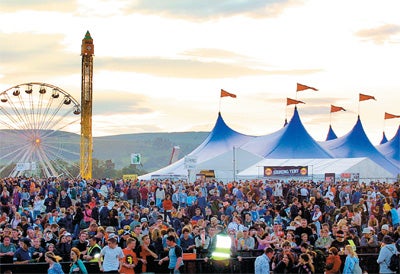Events management
The fast-approaching London Olympics mean there's another exciting reason to get involved in events management

Large events have a tendency to make an enormously positive impact on the population of a city; the 2002 Commonwealth Games in Manchester (pictured above, right), for example, did just that. Its legacy has led to increased student and industry interest in event management courses at Manchester Metropolitan University. In fact, sport management has emerged as a major growth area within the events sector.
The success of the Commonwealth Games - coupled with the eagerly awaited London 2012 - has encouraged the commercial world to address the shortfall of sport event managers within the UK. In light of this, many educational institutes are now collaborating with the governing bodies that are hosting regional, national, and international events to encourage a new wave of home-grown professionals.
The role of an event manager covers a multitude of skills. Essentially, such a person should have an excellent knowledge and understanding of business management: the typical event management course will attempt to compile an essential tool kit for future managers within its syllabus. It should cover project management, operations management and knowledge about health and safety. Once the foundations have been laid, courses will specialise in specific areas within the events sector. Sports events, festivals (such as T in the Park pictured above, left), and exhibition management, to name a few, are among the popular programmes in most universities.
Commercial partnerships are an essential part of events courses, as they enable students to have current and relevant experience while studying; as a result, employers remain a vital part of the event management teaching strategy. Graduates who have excelled on their student placements are frequently offered permanent employment through the company they have been placed with.
Industry benchmarks are set by a number of associations and cover each type of company operating within the events sector; in turn, these associations often have an educational arm. This is crucial for students and recent graduates to gain a greater understanding of the industry they intend to enter, as it encourages applied research and knowledge of current international and national developments, including any changes in legal requirements.
Hiscox, the commercial insurance company, has estimated that the events industry is worth £11bn to the UK economy; the industry has a financial responsibility to increase the standard of graduates so that they can perform successfully in a competitive marketplace. KPMG, the accounting and consulting firm, conducted a 2006 study of the event industry in the West Midlands, which revealed a £6bn contribution to the regional economy. That is not an amount that people can ignore, which the increasing interest in event management courses reflects.
Event management as a course in the UK made its first appearance at Leeds Metropolitan University back in 1996. However, the teaching of events management can now be found in educational institutes throughout the UK: a Ucas course search will reveal that over 60 institutions have a range of courses in event management. It can also be combined with many other subjects as a joint-honours course, giving graduates an added edge. The combinations available are not necessarily ones you would expect either: music or drama; countryside management; and even festival management with entrepreneurship or radio production. The majority of straight event management courses require two or three A-levels, with a minimum of 200 Ucas points for entry.
Courses are generally three years full-time, or four years with an industry placement or a full- or part-time Masters. A broad range of assessment is used on event management courses, as graduates need to be able to present information clearly and inventively to clients. Assessment will include reports, essays, presentations, seminar contributions and other practical work. A major final-year project will contribute to a significant portion of the overall grade.
Graduates find themselves working for event agencies, local authorities, independent event companies and international commercial operators. You could work on a myriad of different events designed to suit different clients - art galleries, bar and restaurant openings, team-building days, conferences for global companies, and product or campaign launches, for instance - with party numbers ranging from 5 to 5,000.
Although an exciting and glamorous industry, it's worth remembering that events are a lot of hard work: while guests are enjoying themselves at an event your firm has planned, you are busy working! However, the sense of achievement you get after a successful event is hard to beat.
Paul Walters is senior lecturer in events management at Manchester Metropolitan University, www.hollings.mmu.ac.uk
Subscribe to Independent Premium to bookmark this article
Want to bookmark your favourite articles and stories to read or reference later? Start your Independent Premium subscription today.

Join our commenting forum
Join thought-provoking conversations, follow other Independent readers and see their replies